Tripartite charisma rivalry among MGR, Karunanidhi and Indira
by Sachi Sri Kantha, June 19, 2025
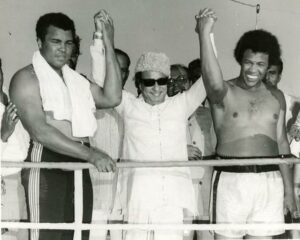
Muhammad Ali (lt) with MGR; Jimmy Ellis, to MGR’s left., Jan 31, 1980
Regarding the contents in Part 81, I received the thoughts R. Kannan on May 12th. These were as follows:
“Thank you for Part 81—a meticulous compilation of the events of the 1980 general elections in Tamil Nadu, including the alliances and previous merger talks between the Kazhagams led by Biju Patnaik. Although I have written about it and presented all that Karunanidhi recorded or said, as well as [journalist] Solai’s version of how MGR desired a merger soon after the 1977 victory, MGR’s purported desire has always baffled me. With Panruti Ramachandran remaining almost incommunicado due to his advanced age, and leaders of that time mostly gone, we will never know exactly what went into MGR’s mind.
According to Karunanidhi, Congress first proposed the DMK-Congress (I) alliance. This could be true, although I have heard that Karunanidhi began to consider reconciling with Congress soon after the 1977 defeats. Both parties needed each other and wished to bury the hatchet. The idea of a coalition government, combined with the lack of goodwill between the local Congress leadership and the DMK, led to the failure of the arithmetically stronger alliance. MGR won the 1980 assembly elections on a wave of sympathy. It was a triumphant return.”
My response to Kannan’s comments were,
“I do agree with all your points on the DMK – ADMK merger issue of 1979, mentioned in your book and this mail. I do understand Panruti Ramachandran’s current health status. Though I didn’t mention it (for lack of solid evidence), its my hunch that MGR might also have listened to other senior DMK folks (like V.R. Nedunchezhiyan and K. Rajaram who quit DMK to join his party) and eventually decided against the merger. These guys were 10 years older than Panruti Ramachandran.”
Twice postponed 5th International Tamil Research Conference
Jaffna was the venue for the 4th International Conference-Seminar of Tamil Studies in January 1974. Subsequently, the venue for the 5th Conference was decided as either London or Dakar (Senegal). The then President of Senegal was Leopold Senghor (1906-2001), a cultural theorist and poet. He served as the first president of Senegal from 1960 to 1980. Like many of the freedom fighters in newly independent African nations, Senghor became autocratic towards the final years of his tenure. Though the date for the 5th International Tamil Research Conference was fixed to be held in October 1978 in Senegal, MGR’s government negotiated the location transfer from Senegal to Madras. And the new date fixed was January 1980.
It’s more than obvious that MGR had a personal agenda/interest in this venue transfer. He wished to best his rival Karunanidhi in deeds, as a patron of Tamil language and literature. Karunanidhi, during his first tenure as the Chief Minister (1969-1976) failed to sponsor an International Tamil Research Conference. Previously, the 2nd International Tamil Research Conference was held in Madras under the auspices of DMK government, during Anna’s tenure in 1968.
As the Lok Sabha elections were scheduled to take place during Dec 1979 – Jan 1980, MGR government opted to postpone the Tamil Conference from Jan 1980 to June 1980. Then, there had to be a second postponement, (1) due to the Feb 17, 1980 dissolution of Tamil Nadu state government by Indira Gandhi. (2) Scheduling of the State Assembly Elections, fixed in May 1980. Eventually, the 5th International Tamil Conference was held in January 1981, at Madurai. More details about this Conference, will appear in a subsequent chapter.
Visit of boxing champion Muhamad Ali to Madras
Boxing champion Muhamad Ali (1942-2016) visited New Delhi, with his wife Veronica on January 25, 1980 and met with Indira Gandhi and her family members. Pleasantries exchanged had been recorded, by Ajoy Bose, as follows:
“Mrs. Gandhi: I hope you will enjoy your stay in India. It is a country with a lot of charm, a great tradition and even greater people. I am glad that you have come. You are very welcome. What are your plans?
Ali: I have left the boxing ring now. I spend most of my time these days trying to bring peace in the world to promote love and friendship.
Mrs Gandhi (interrupting): This is what we in India are also trying to do.
Ali: Till now, I had a feeling that I was the greatest expert on how to win after losing. But I now find you too are as good. And I say with confidence because I have met the greatest leaders: Carter, Brezhnev, Deng Tsiaoping, you name them. But your comeback has been too spectacular – even more than time. I have no hesitation in conceding that you are the greatest in your sphere. I only regret that in a way you have punctured my ego.
(Everybody breaks out in loud laughter and a smiling Mrs Gandhi does not reply)…”
From the net, I could pick up few details about this Muhammad Ali’s goodwill tour to India. It was arranged by a small film and TV production company, Seven Stars Ltd, that had offices in Piccadilly, London. One of the sponsors was India-born British business magnate Lord Swraj Paul (b. 1931), a personal friend of Indira Gandhi. An exhibition boxing match between Ali and his sparring partner Jimmy Ellis (1940-2014) was arranged in Madras on July 31, 1980. MGR was there to raise the hands of both Ali and Ellis (see the photo presented nearby). A brief news item on the following day carried this report:
‘Former professional world heavyweight champion Muhammad Ali today entertained an estimated 20,000 boxing fans in an exhibition bout with his sparring partner Jimmy Ellis and a few local boxers here today. This was Ali’s last engagement in India.
Ali, unlike in his Delhi and Bombay bouts, exhibited some of his specialities in the five round encounter here. In the third round he demonstrated some fast left jabs, while in the fourth, he entertained the people with his favourite rope-a-dope tricks. In the fifth and final round he grounded Ellis twice and conceded one ‘grounding’ at the end.”
Unlike the pleasantries exchanged by Ali and Indira Gandhi, what transpired between MGR and Ali, has not been recorded for public and is lost to history now. It was reported that while Ali was in Madras, he received an ‘urgent call’ from President Jimmy Carter. What President Carter had requested was, as his personal ambassador, Ali should ‘immediately fly to Saudi Arabia and Africa to pass the message of boycotting the Moscow Olympics scheduled in 1980, as a protest for Russia invading Afghanistan, a Muslim country’. Within three hours, Ali and his entourage left for Riyadh, Saudi Arabia, in a chartered flight.
Specific datelines: Feb – March 1980
Feb 5, 1980 – MGR visited New Delhi to meet Indira Gandhi. Though the announcement came about an evening meeting, it was postponed due to Indira Gandhi being indisposed. The meeting also didn’t happen the next day as well. Thus, MGR returned to Tamil Nadu, with his colleague Panruti S. Ramachandran.
Feb 15, 1980 – A procession tagged as ‘the Union of Progressive Parties’ (DMK, Congress- Indira, Muslim League) was held in Madras and a list of complaints against the ruling Anna DMK was handed to the governor of the State.
Feb 16, 1980 – A solar eclipse was seen in India, after a lapse of 84 years. Occult specialists of India preyed on the fear of gullibles for bad omens resulting from the solar eclipse.
Feb 17, 1980 – MGR government abruptly dismissed by Indira Gandhi, after a 2 years and 232 days tenure. Apart from Tamil Nadu, state assemblies of eight other States were also dissolved. Among these, four states (Bihar, Gujarat, Madhya Pradesh and Rajasthan) had Janata Party rule, two states (Orissa and Uttar Pradesh) had Lok Dal Party rule, and Maharashtra state had a coalition of anti-Indira Congress Party rule.
Late Feb, 1980 – Few MGR’s Cabinet Ministers (P. Soundarapandian, G.R. Edmund, and women ministers P.T. Saraswathi, Subbulakshmi Jagadeesan) as well as Aravinda Bala Pajanor (Central Government minister in Charan Singh Cabinet) deserted MGR’s party.
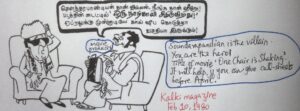
Kalki magazine cartoon 1 – Feb 10, 1980
Nanjil K. Manoharan, nominal No.2 in MGR’s dismantled Cabinet (from 1977 to 1979), opted to quit Anna DMK party in anger after being left out in the ‘high-level decision making group’ for strategy planning for the forthcoming Legislative Assembly election.
March 1, 1980 – DMK and Congress (I) alliance forged for the forthcoming State Assembly elections. It was decided that, (1) In the event of this alliance winning the election, the chief minister position will be offered to DMK; (2) Both parties will compete in equal number of constituencies.
March 2, 1980 – MGR showed his opposition by forging a ’16-party’ alliance with National Congress (Kumari Anandan), Kamaraj Congress (P. Nedumaran) and nonconsequential minor parties, in a public rally. At the procession rally, property damage and arson occurred at certain places, including actor Sivaji Ganesan-owned cinema theater Shanti, and a police station at Anna Salai.
Mar 3, 1980 – Nanjil K Manoharan, joined DMK. Another prominent associate of MGR, Kovai Chezian (who also had produced movie starring MGR), also quit MGR’s party to join DMK.
Abrupt termination of MGR’s first tenure as Chief Minister
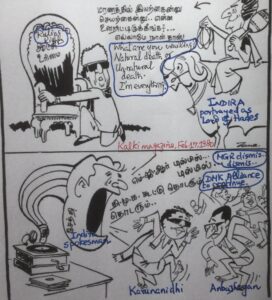
Kalki magazine cartoon 2 – Feb 17, 1980
Political gossips in New Delhi as well as in Madras circulated that, that it will be a matter of time that MGR’s government will be dissolved, if Indira and her son Sanjay opts to activate the pleading of their alliance partner Karunanidhi. Three periodic cartoons, which appeared in the Kalki magazine (Feb 10, 1980 and Feb 17, 1980) are presented nearby. Humor in Cartoon one tells the pliable story of a MGR’s Cabinet minister (P. Soundarapandiyan) deserting him, and a movie producer proposing to MGR – a movie to be made, with MGR as a hero, the deserting minister as the villain, for a film titled as ‘One Chair is Shaking’. Cartoon two, in two frames presents two scenarios – featuring MGR, Indira Gandhi and Karunanidhi:
Top frame: While MGR is holding the hands of ‘Chair’ tagged ‘ruling rights’, Indira appears as the smiling Lord of Hades in Hindu mythology, in a bull, dangling a noose rope. The balloon caption for Indira says, ‘What are you wailing?- Natural death or Unnatural death…I’m everything.’
Bottom frame: Indira’s spokesman Prakash Chandra Sethi (1919-1996) announces in a gramophonic voice ‘MGR dismiss, dismiss. DMK alliance to continue’; Karunanidhi and his deputy Anbazhagan dancing to the tune.
On the DMK – Congress (Indira) Alliance
About the alliance between DMK party and Indira’s Congress Party and its aftermath, three commentaries that appeared in the aftermath of Jan 1980 Lok Sabha parliamentary election are abstracted below:
First: An anonymous commentator wrote in the Economic and Political Weekly (Jan 16, 1980), as follows:
“….Unholy alliance between the architect of Emergency and its arch victim in Tamil Nadu created certain predictable dissensions inside both the parties. But party politics have been so divorced from ideology and political cadres have become so inured to being used by their supreme leaders, that these dissensions were only minor and were easily contained. Only Nedumaran, Indira Gandhi’s hope in Tamil Nadu two years ago, left her fold….
Karunanidhi’s all-too-quiet reaction after the elections epitomizes the uneasy balance that now exists in Tamil Nadu. In stark contrast to his usual aggressive style, the most that Karunanidhi could bring himself to say, in the face of an apparently massive defeat for AIADMK, was to admonish MGR to decide for himself whether he should resign or not. Behind this appearance of ultrasobriety lurks a deep concern for what is in store for his party in Tamil Nadu. If an election is called now, he will not be able to turn down Congress-I demands for majority seats, and if he goes alone, MGR will win again; either way, he will not be the chief minister. Predictably, MGR’s reaction has been jumpy. He maintained, quoting statistics, that he had not lost his mandate, that he got as much votes in 170 assembly constituencies now as he did in 200 in 1977 – a neat sleight of hand that sidestepped the fact that Janata was with him now and was against him in 1977. In the same breath he went on to expatiate on how he saved Indira Gandhi from Karunanidhi’s belligerence, how he fought the Special Courts bill, how much more natural would have been an alliance between his party and Congress-I and how the possibility of this happening again cannot be ruled out. Overreacting to the situation, the AIADMK General Secretary announced that the party was ready to face assembly polls right now, an offer that Indira Gandhi is not keen to take up.
For Indira Gandhi, the status quo is not without its advantages. Karunanidhi is now firmly on her side and knowing MGR, she can be certain that he will jump at her least bidding so long as she lets him stay in power. A Karunanidhi in power may not be that pliable. She may not also be ready to push her luck too far with Karunanidhi or with the electorate right now. There is, thus, in Tamil Nadu, stability of sorts – the sort that Indira Gandhi excels in fostering…”
It was not too long (merely four weeks), that the opinion expressed in the above commentary was proved wrong by Indira Gandhi. She terminated MGR’s first tenure prematurely on Feb 17, 1980. Again, the false prediction of this anonymous commentator, that “the next chief minister of Tamil Nadu may very well be from the Congress-I, bringing events to a full circle” was also proved wrong due to underestimation of MGR’s charisma among the Tamil Nadu voters and competing strategy.
MGR correctly read the mind of his political rival Karunanidhi, prepared himself strategically; how Karunanidhi would force his hand on Indira Gandhi, as part of the deal in alliance, calling for early dismissal of MGR government. Anticipating this premature dismissal by Indira Gandhi, MGR played his other card of re-entering his acting profession, till the next elections were called.
Second: A brief commentary by Chitra Subramaniam, in the India Today (Feb 16, 1980) had the following details:
“…Stating that he [MGR] would return to acting in April and that his first film would be released by Diwali, MGR is aware that his return to filmdom could well be at the risk of his political career. The verdict of a court case regarding this very issue – as to whether or not he can act while in office [as a Chief Minister] – is pending. MGR will launch his own film Imayathin Uchiyil (Atop the Himalayas) with himself in the lead, playing the standard hero – one who is a paragon of virtue, knowledge and wisdom and one who rescues damsels in distress while being precariously perched on tree tops and cliff tops.
MGR’s decision to return to films came in just as one of his ministers P. Soundarapandian was preparing to quit his Cabinet and the party. There was also a fear of the Assembly being dissolved. With a comeback, MGR hopes to kill two birds with one stone. He hopes to give his sagging image – political or otherwise – the much needed boost and more important, he needs the money to pay the heavy income-tax arrears he has incurred over the years…”
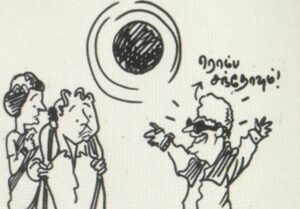
Kalki cartoon 3, March 2, 1980
Third: an editorial that appeared in the Kalki weekly (Mar 2, 1980). This was titled, ‘High volume roars; Lowest deeds’, and built on the sentiments expressed by a Madras reader which was critical to the deed of Karunanidhi. Excerpts of this editorial follow:
“Though it will be foolish to expect from an old prime minister who had begun her tenure traits such as logic, reason, dharma and straight thought, dissolving a Tamil Nadu state government that won an election fairly and until now had retained a majority is an act of indecency. The DMK party leader who had publicly instigated and supported the deed had decorated himself with a historical blemish. One time, DMK had ridiculed the Congress Party folks for carrying ‘kavadi’ to Delhi. [Note by Sachi: ‘kavadi’ is a form of penance to Gods in Hinduism]. Isn’t it the same for what Karunanidhi is doing now? The one who had failed in capturing the ruling party members towards him, now begs the Mother [Indira] for a political underhand deal; and after arranging this, return to Meenambakkam airport and self-garland himself devoid of dignity.
There is a line in the ‘Parasakthi’ movie: ‘high level temple towers – low grade hearts’. One can repeat the lines in the same fashion now – ‘high volume roars – lowest deeds’. [Explanatory Note by Sachi: ‘Parasakthi’ was the trendsetting 1952 movie, scripted by Karunanidhi.]
by S. Vaanisankar, Chennai 5.
Kalki reader Vaani Sankar had realistically portrayed the current political trend with forceful words. We are pleased to publish the title of this editorial, by borrowing his words. There is a big difference between the earlier Janata Party act of dissolving the State assemblies, and the current act of Indira dissolving the State assemblies. [During Janata period], majority of the State assemblies then had completed their allotted time and were kept in extension by President’s decree. This had been pointed by Vajpayee and the then Supreme Court. State assemblies dissolved now [by Indira] have yet to complete their allotted time frame.
For a logic, if we take the argument that the decision of Janata was wrong then, it may be prideful boast for the Prime Minister that ‘I will not repeat the mistake made by Janata’. What is there to brag, ‘I’ll do the same mistake’. One thing is certain. Indira Gandhi cannot tolerate opposition parties. Shouldn’t one call an individual who cannot tolerate opposition, as a dictator?..Indira cannot have patience. After gaining a majority in the Lok Sabha, she’s angling for a majority in the Rajya Sabha.
There may be difference of opinion on the issue whether Mr. MGR was competent or not. But, there is no doubt that a great injustice has been done to him and his party. We believe that this leader who has abundance of public admiration will take into account, the sympathy sentiments generated now, effectively.”
MGR’s public reaction to the dismissal of his government was a comment ‘So much pleased’ with a smiling face, as presented in a Kalki cartoon of March 2, 1980. (Cartoon 3). This sort of fortitude mixed glee comment from MGR, might have perplexed Karunanidhi and Indira Gandhi, about their political deed. This cartoon also indicates the solar eclipse, which occurred on the day prior to the end of MGR’s first tenure as the Chief Minister. There were multiple interpretations. First, as a seasoned professional actor for decades, MGR was ‘playing to the gallery’ and he knew well how to milk sympathy while keeping his emotions under control, as well as keep his rivals wrong-footed. Secondly, Karunanidhi, and not Indira Gandhi, was his chief rival; thus, humoring Indira was a better strategy. Thirdly, MGR would have sincerely felt that he could return to his chief profession of cinema acting for tension relief.
Party Deserters: ‘Rats’ that jumped ship
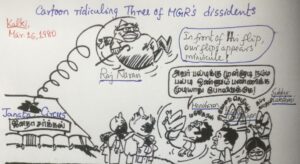
Kalki magazine cartoon 4, Mar 16, 1980
Politicians Nanjil K. Manoharan (1929-2000), P. Soundarapandiyan, G.R. Edmund (1931-2013), P.T. Saraswathy (1935-2009), Subbulakshmi Jagadeesan (b. 1947), Kovai Chezhiyan (1931-2000) and Aravinda Bala Pajanor (1935-2013) came to be marked as the ‘rats’ that jumped ship in Tamil Nadu political scene. The first five held Cabinet minister positions in MGR’s first tenure. The last two were also ‘trusted’ by MGR and elevated to prominent ranks in the party. A Kalki cartoon (Cartoon 4) of March 16, 1980, ridiculed their flips as inconsequential, in comparison to the roof-breaking circus stunts shown by ex-Janata Party leader Raj Narain, who split the party vertically in 1979.
‘It will be good for the party, if those who cannot withstand the shock of defeat leave us’ was MGR’s public response to deserters. Kondath Mohandas, Police Chief of Intelligence cum MGR’s ‘bogeyman’ also identified a few more deserters. Along with P. Soundarapandiyan who served as the Minister for Harijan welfare in the MGR’s cabinet, L. Arumugam MLA for Thirunavalur, defected to Congress (Indira) party. S. Selvaraj, MLA for Samayanallur defected to the DMK, followed by two Rajya Sabha members, Noorjahan Razaak and Venga. Mohandas also provided a reason for public vandalism on the Sivaji Ganesan –owned cinema theater Shanti, on March 2, 1980. According to him, “Sivaji Rasigar Manram [aka, Sivaji Ganesan fan circle], functioning as an auxiliary wing of the Congress (I) party was vociferous against the Anna DMK ministry’s continuance in office.”
‘Chempian’, a Kalki columnist [Mar 16, 1980], criticized the selfishness of Anna DMK party deserters with a sarcastic commentary:
“Those who leave the party during a difficult period are tagged as ‘rats’ in English. In India, there is no dearth for such rats. We had seen, prior to and after the election, such personalities who jumped from Indira Congress. Now we observe those who jump from Anna DMK to DMK parties. Soundarapandian deserted. Then, Manoharan, and recently Kovai Chezhiyan and Subbulakshmi had jumped to other side.
Suddenly, all had a spiritual erudition that MGR didn’t allow them to function on their own, and he had been observing them constantly. But, while holding the Cabinet minister rank and enjoying all its benefits and appurtenances, they couldn’t realize this. How could that be? As long as, the ship is not sinking, these rats could dance in the under deck all along. They should be sent to Moscow Olympics for competing in long jump contest. India will definitely get the Gold medal.”
A paragraph from Mohandas’s memoirs record the following. “Though many rats (including ex-Finance Minister Nanjil Manoharan) fled from what they thought was a sinking ship, the MGR vote-bank was not only safe but outraged by the dismissal of his government, which they had earlier thought would not be affected by the results of the Parliamentary elections. It was this belief which had induced them to vote for Indira Gandhi. MGR undertook state-wide tours and consolidated his support by emphasizing the incalculable harm done to him and democracy by Indira Gandhi’s dismissal of his ministry which had a good majority in the Assembly. He pointed out that the issues in a Parliamentary election were different from those in a [State] Assembly election, and that it was a clear case of stabbing in the back. The real MGR, with all his charisma surfaced, and the people – especially in the rural areas – pledged him their solid support. As in his films, he was at his best when fighting a battle – with or without swords- with his back to the wall.”
How MGR achieved this comeback, will be analyzed in the next chapter.
Cited Sources
Anonymous: Moment of truth for MGR. Economic and Political Weekly, Jan 16, 1980, pp. 141-142.
Ajay Bose: Ali to Mrs Gandhi: ‘You are the greatest’. Sunday Magazine, Feb 1980.
‘Chempian’: Seithikal Vasippathu ‘[News to be read]. Kalki, Mar 16, 1980, p. 17.
Kannan: MGR – a Life, Penguin Books, Gurgaon, Haryana, 2017, pp. 274 – 286.
Karunanidhi: Nenjukku Neethi, vol.3, Thirumagal Nilayam, Chennai, 1997, pp. 388-406.
Reginald Massey: Working with Muhammad Ali, the boxing champ. A web posting, in www.indiaofthepast.org site (accessed, Feb 19, 2025).
Kondath Mohandas: MGR – The Man and Myth, Panther Publishers, Bangalore, 1992, pp. 49-52.
Muthukumar: Vaathyar – MGRin Vaazhkai [Teacher – MGR’s Life], Kizhakku Pathippagam, Chennai, 2009, pp. 162-164.
Subbiah: Foreword. Proceedings of the Fifth International Conference-Seminar of
Tamil Studies, vol.1, M. Arunachalam (ed), International Association of Tamil Research, Madras, 1981.
Chitra Subramaniam and Arthur Pais: MGR: Double role? India Today, Feb 16, 1980, pp. 33-34.
UNI news item: Ali entertains Madras crowd, Hindustan Times, Feb 1, 1980.
****
I remember reading Tamil version of Mohandas’s book, but thanks to Dr. Sachi for quoting the remarkable lines from his book, “As in his films, he was at his best when fighting a battle – with or without swords- with his back to the wall.”, It sums up the larger than life image of MGR. I enjoyed the description of interaction of Ali and Indira and it is amazing to know about the greatness of Ali such that Carter depended on him to score diplomatic victories!